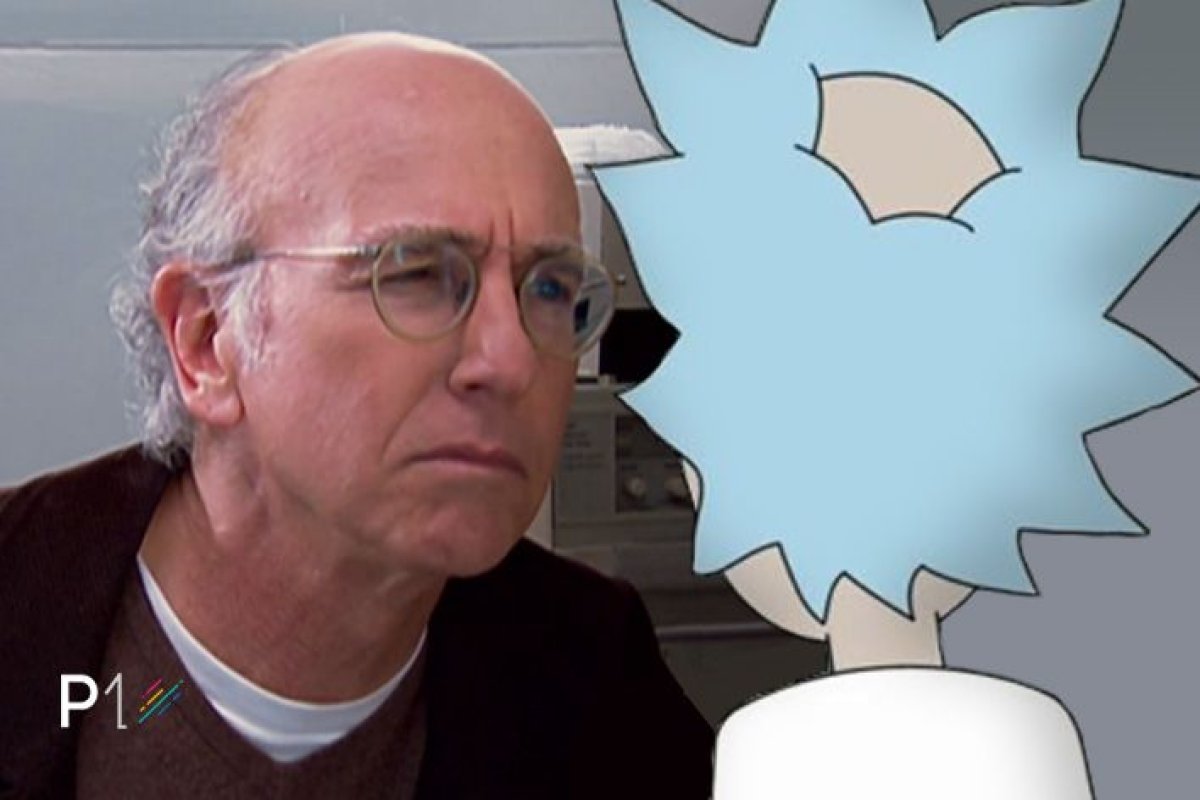Rick Sanchez, one half of the Rick and Morty namesake duo, thinks he knows all he needs to know about people. "You have to understand, that as far as grandpa is concerned, you're both pieces of shit," he tells Morty and his sister Summer in Season 2. "I can prove it mathematically. This has been a long time coming anyway. Let me grab my whiteboard." Rick can be devastating when attacking his own family, especially since he imagines himself free of what he sees as their biggest vulnerability: emotional attachment. But would he fare as well against someone more like him? Could his seemingly boundless confidence survive a withering Larry David stare?
One of Curb Your Enthusiasm's longest-running jokes (maybe second only to "pretty, pretty, pretty good") is the Larry David Stare, deployed only at the limit of his ability to comprehend other people, leaving Larry without perfect knowledge of the situation or the motives of another. He arrives at this place often, with no other option than to stare, confronting duplicity with an attempt to penetrate their heart. For Larry, the world's mysteries are found in other people.
But while Larry's reaction to society is, in some ways, opposite to Rick's, the two characters have a lot in common. Enough that Larry is often fan-cast as Rick for imaginary live-action Rick and Morty movies. For one, both are endowed with superpowers. As animated sci-fi, Rick's abilities are a little more obviously extraordinary. He takes what he wants, destabilizes governments and traverses multidimensional space as freely as we visit the refrigerator. But what attracts people to Rick isn't so much having the portal gun, as it is his confidence, brazenness, certitude and utter lack of embarrassment (the show's writers have worked to pop Rick's anti-hero mystique, especially in Season 3, but it refuses to take).
A willingness to attack social pieties with an utter lack of shame, insulated by his wealth and status rather than sci-fi gizmo smarts, could also describe Larry's appeal. In Season 8 of Curb Your Enthusiasm, Larry David's agent Jeff describes Larry as a " social assassin," capable of tearing through the invisible mesh of polite restraint, minor miscommunications, awkwardness, manners, discretions and indiscretions that restrain our ability to get everything we want from interactions with other people. In the most recent season, Larry fully embraces his social superpower, deploying schemes like "The Pickle Gambit" (in which any man's attention can be drawn away by the possibility of demonstrating their strength on a pickle jar) or the "accidental text on purpose," to control his environment and gets what he wants from others.
Larry even has a psychic ability of sorts, prying from people's minds full audits of their behavior or mentality through dogged chit-chat and a complete unwillingness to be deflated by embarrassment, accept ambiguity, or allow the object of his inquiry to run out the clock. It doesn't always work, but it often plays out in Larry's favor in unexpected ways.
Rick doesn't cope so well with failure. He ends the Season 3 premiere ranting into Morty's stricken face, "I just took over the family, Morty!" But by the season's end, that control is shattered. Susan Sarandon (who plays a family therapist in "Pickle Rick") strips away Rick's bluster in front of his daughter, Beth. And, by the season finale, even Rick can see he's lost the game he insisted he was never playing, whining impotently, "There's infinite timelines Morty, why would I stay in the one where I trashed the White House, became an enemy of America and the lowest status character in my idiot family?"
He, of course, stays.

In the eye is a hole. It's a void that defines Larry's life. His crisis, and his full investment, is in that stare. Rick is left with only scorn to guard him in this context. He could retreat into nihilistic trivia, turning away from the great mystery of the Larry stare to embrace arbitrary nugget sauces, but there's no refuge there. Larry is master of the trivial too.
Rick has written his own crisis across the multiverse. His absence, if it has a name, might just be God. Or Death. Or some other, vaguer conception of cosmic meaninglessness. His more toxic half, separated from the whole personality in Season 3 episode "Rest and Ricklaxation," swings from insisting on God's nonexistence and asserting his own divine authority, screaming at Morty, "If God exists, it's fucking me!" It's a false confidence, papering over immense insecurity and doubt. In an earlier episode, multiple, time-duplicated Ricks earnestly pray, only to renege when he's no longer in danger, pointing to heaven. "There is no god, in your face!" he says.
But Larry stares at Rick's great terror, unafraid. When Larry goes to heaven, he spends his time arguing about what happened back on Earth. The trivialities become the cosmos, as Larry hurls accusatory obscenities at his guardian angel. For Larry, religion isn't an existential concern, but a cultural one, explored through his relationship with Judaism.
The stare would not go well for Rick. When Larry inevitably ends the stare with a terse "Okay," it's Larry suspending, rather than arriving at, a conclusion. And that's something he's comfortable with, that Rick will never be. It's always a loss, but embraced as a victory.
Winner: Larry David.
Uncommon Knowledge
Newsweek is committed to challenging conventional wisdom and finding connections in the search for common ground.
Newsweek is committed to challenging conventional wisdom and finding connections in the search for common ground.
About the writer
To read how Newsweek uses AI as a newsroom tool, Click here.








